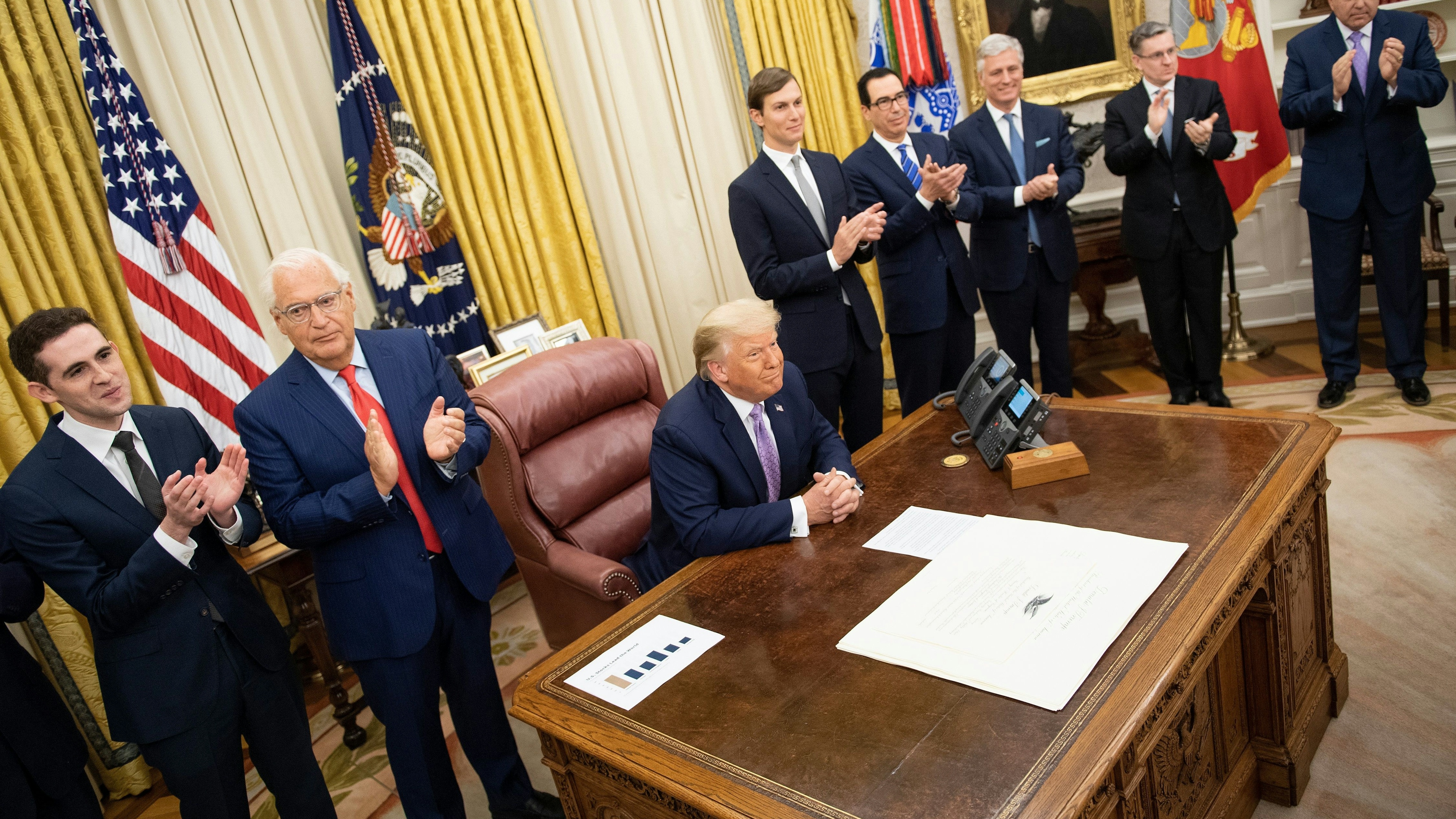It's A Deal
The Story
Israel and the UAE have struck a "historic" deal.
Explain.
Yesterday, the two countries agreed to establish formal diplomatic ties – making the UAE the third Arab country (after Egypt and Jordan) and the first Gulf Arab state to have official relations with Israel. President Trump – who helped put together the deal – said it would create a "more peaceful, secure, and prosperous Middle East." Israel and the UAE have been unofficial allies on certain issues (especially when dealing with Iran), and this could open the door for opportunities in tourism, education, trade, and security between the two. But there already appears to be some disagreement.
What do you mean?
As part of the deal, Israel would have to halt its annexation of the West Bank. But the country's saying 'do we really have to?' and said it's a temporary pause. Quick history: Israel captured the West Bank in 1967 and Israelis have built settlements there. But millions of Palestinians live in the area and want to make it part of their future state. Last year, the Trump admin stood behind Israel's occupation of the West Bank, which didn't sit well with the Palestinians or the EU. Now, despite the new deal, Israeli Prime Minister Benjamin Netanyahu said he's still "committed" to annexing part of the West Bank.
What are Palestinians saying?
They're not happy. They've long relied on Arab countries to support their struggle for independence. Palestinian leaders denounced the deal as a "stab in the back" and demanded that it be reversed. But President Trump suggested that other countries could follow the UAE's lead – and potentially lead toward a more peaceful Middle East. Presumptive Democratic nominee Joe Biden also commended the agreement.
theSkimm
This deal is seen as a major foreign policy win for Trump ahead of the November election. But while Israel and the UAE celebrate, Palestinians feel snubbed by an agreement that affects them but doesn't include them
And Also...This
Who's got some mixed feelings…
President Trump. Yesterday, he said he wouldn't approve nearly $30 billion in funding for the US Postal Service and election efforts because it would give the US "universal mail-in voting." (Although hours later, he seemed to backtrack.) For weeks, the president's claimed mail-in voting would lead to election fraud – despite little evidence of that and...having requested a mail-in ballot for himself. And recently, the USPS has made changes that some say could impact the November election – which Dem lawmakers have called "sabotage." House Speaker Nancy Pelosi (D-CA) said withholding aid for the USPS and absentee voting would undermine "the health of our democracy" and could force people to choose between their safety (in the middle of a pandemic) and getting their vote counted.
...Oh and speaking of mail-in voting, SCOTUS just made it easier for Rhode Island voters to do just that.
What's received a bad report card…
Yale. Yesterday, the Justice Dept accused the university of illegally discriminating against Asian American and white applicants in its admissions process. The allegation comes after a two-year DOJ investigation following complaints from Asian American students. And marks the Trump admin's latest move against affirmative action. It found that race was a "determinative factor" and that Asian American and white students were less likely to be admitted to Yale than Black students with similar academic records. Yale denied the allegation and said it considers many things when reviewing applicants. Now, the DOJ has ordered the school to stop using race or national origin as a factor in its upcoming admissions. But the Ivy League school says it won't change its policy.
Not the only one: The DOJ also supported a lawsuit against Harvard University for similar practices. A judge ruled Harvard hadn't broken the law, but the decision's been appealed.
What's pointing the finger at the coronavirus pandemic...
The NY Federal Reserve. Yesterday, it released a report finding that households with children are more likely to be suffering severe financial hardship. And that this puts them at more risk of dipping into savings, missing rent payments, or not having enough food. The risks are even higher for lower-income and single-parent households who are more likely to depend on gov support.
The CDC. A new report found that depression symptoms among Americans were four times higher in June of this year (compared to last year). And that anxiety symptoms were three times as high. The increase was especially notable in young adults, essential workers, and unpaid caregivers. As well as minorities. The CDC said support systems to address these mental health concerns "will continue to be needed urgently."
Skimm More: Our guide has tactics for coping with anxiety because your mental health is always important, especially right now.
What's showing some signs of improvement…
Unemployment. Yesterday, the Labor Dept said new unemployment claims fell to 963,000 last week – the first time since March they've been below 1 million. And it suggests the labor market could be recovering.
Psst…things may be moving in the right direction, but the unemployment rate's still in the double digits. Here's what that could mean for you – even if you're working
Who'll inspire us today and forever...
Live Smarter
Sign up for the Daily Skimm email newsletter. Delivered to your inbox every morning and prepares you for your day in minutes.
